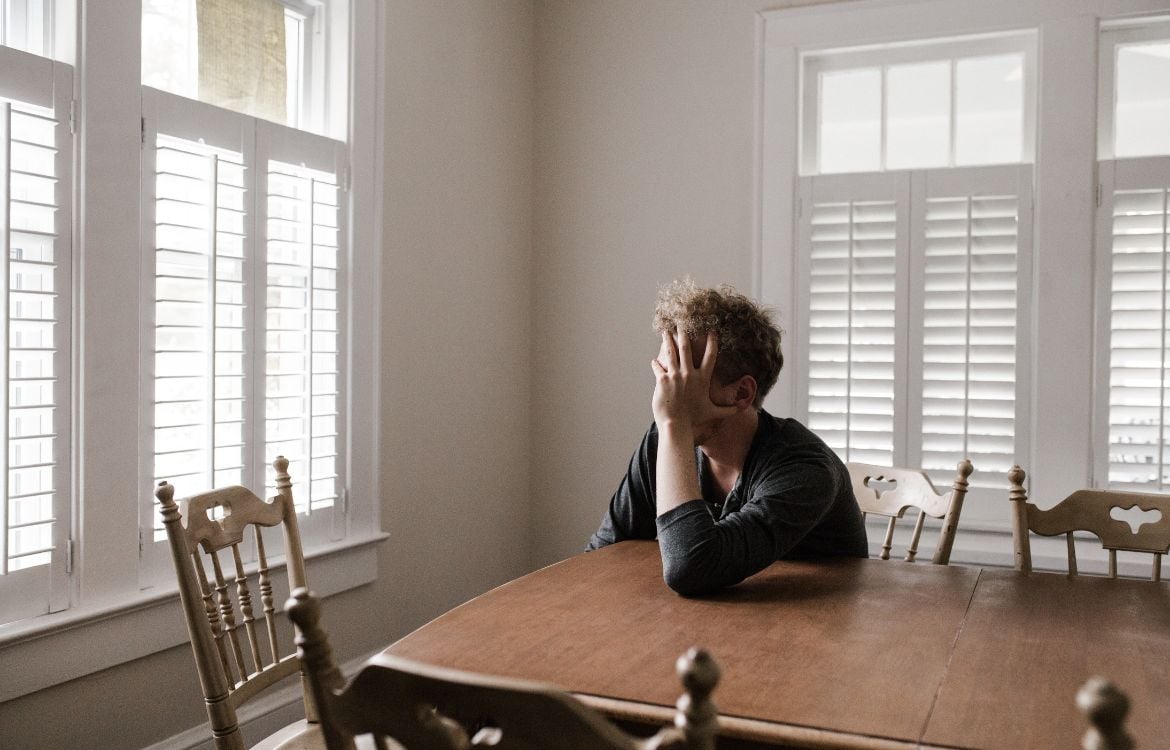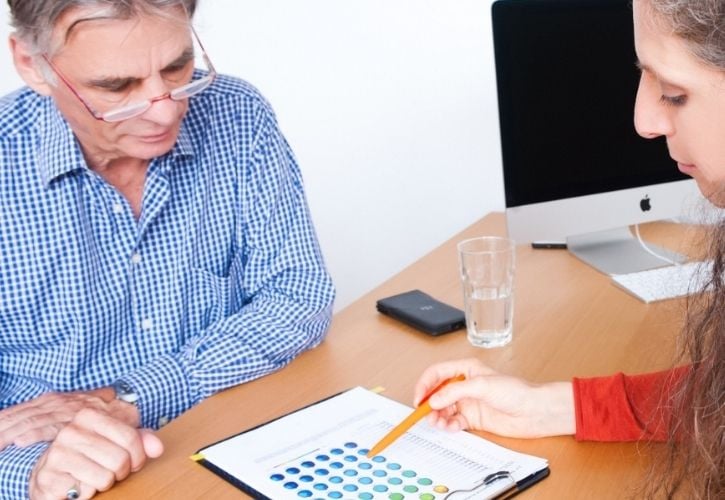Depressie
Hulp bij uw depressie? Wij helpen u snel en effectief met een behandeling op maat

Direct naar:
Depressie is één van de meest voorkomende psychische stoornissen en onderscheidt zich van ‘normale’ somberheid door de aard en duur van de symptomen. Depressie kan worden behandeld door middel van psychotherapie, EMDR (in geval van trauma), medicatie en rTMS.
Onderzoeken laten zien dat er zowel ‘biologische’ als omgevingsfactoren zijn die een rol spelen bij een depressie. Zo kunnen erfelijke factoren een rol spelen, hoewel de exacte genetische kenmerken nog steeds niet bekend zijn.
Ook kunnen bepaalde stoffen in de hersenen uit balans zijn (zoals neurotransmitters of groeifactoren). Tevens is bekend dat bepaalde delen van de hersenen minder actief zijn, terwijl andere delen van de hersen overactief zijn bij mensen met een depressie. Ook weten we dat zware emotionele of traumatische ervaringen uit het verleden, of emotionele verwaarlozing een risicofactor vormen en de kans op een depressie kunnen vergroten.
Symptomen depressie
Soorten depressie
Er zijn verschillende vormen van depressie. Een depressieve stoornis kenmerkt zich doordat iemand zich een lange tijd gedurende het grootse gedeelte van de dag neerslachtig voelt en/of een verminderde interesse of plezier kent in alle of bijna alle activiteiten. Hierdoor lukt het niet meer goed om te functioneren de activiteiten uit te voeren zoals eerder.
Therapieresistente depressie
Er kan sprake zijn van een eenmalige episode of van terugkerende episoden. Wanneer een depressieve episode ondanks behandeling niet verdwijnt, is sprake van een therapieresistente depressie. Hiervan wordt gesproken wanneer twee of meer (adequate) behandelingen onvoldoende resultaat hebben opgeleverd. In dat geval wordt rTMS door de zorgverzekeraar vergoed.
Bipolaire depressie
Een bipolaire depressie kenmerkt zich door de afwisselende perioden waarin iemand zich een tijd neerslachtig voelt met tijden waarop iemand juist zeer veel energie heeft, weinig slaapt, zich onrustig voelt en opgewekt kan zijn. Bipolaire depressie wordt ook wel manisch-depressief genoemd.
Psychotische kenmerken
Bij 10 à 15% van de depressies is er sprake van psychotische kenmerken, d.w.z. er is een gestoorde toetsing van de realiteit. Dit uit zich dan meestal in wanen (oncorrigeerbare gedachtedwalingen). Vaak is de inhoud van die wanen in overeenstemming met de depressieve stemming: de thema’s staan bijvoorbeeld in het teken van persoonlijke tekortkomingen, falen, schuld, dood of straf.
Enkele feiten over depressie

- Het is de op één na grootste doodsoorzaak na hartziekten en het is aangetoond dat depressie een grote bijdrage levert aan coronaire ziekten.
- Depressie komt bij vrouwen tweemaal zo vaak voor als bij mannen en komt het meest voor in de leeftijd van 25-45 jaar.
- Minder dan 30% van de mensen met een depressie voelen een vermindering van de symptomen door het slikken van antidepressiva.
- Depressie zorgt voor meer absentie dan elke andere stoornis en het geeft werkgevers veel ‘productieverlies’.
Oorzaken van depressie
Neurobiologische factoren
Uit onderzoek is gebleken dat depressie een verstoring is in de balans van bepaalde stoffen in de hersenen. Ook is uit recent onderzoek gebleken dat depressie samenhangt met een bepaald verstoord patroon van hersenactiviteit, waarbij bepaalde delen van hersenen minder actief zijn en andere delen juist te actief. Behandeling met rTMS is gericht op het herstellen van deze balans.
Genetische factoren
Er kan sprake zijn van een erfelijke component die een rol speelt. Kinderen van ouders met een depressie hebben driemaal zoveel kans om zelf depressief te worden, dan kinderen van ouders die niet depressief zijn.
Licht
Soms is bij een vaker terugkerende depressie sprake van een seizoensgebonden patroon. In dat geval speelt het korter worden van de dagen en een tekort aan licht mogelijk een rol. Dit is vaak goed te voorkomen middels lichttherapie.
Psychosociale factoren
Ingrijpende levensgebeurtenissen, zoals een echtscheiding, overlijden, ontslag, maar ook het krijgen van een kind en promotie kunnen een belangrijke rol spelen in het ontwikkelen van een depressie. Dit zijn gebeurtenissen die erg veel spanning en stress op kunnen roepen, waardoor je het niet meer ziet zitten.
Het sociale leven kan ook juist zorgen voor een helende werking van de depressie. Een stabiele relatie, vrienden die je steunen en helpen en een fijne baan kunnen zorgen voor een goede structuur in je leven en een sociaal vangnet.
Psychische factoren
Het blokkeren van pijnlijke gevoelens en gedachten door onverwerkte traumatische (jeugd)ervaringen kunnen het ontstaan van een depressie vergroten.
Medicatie, middelen en lichamelijke aandoeningen
Bepaalde medicijnen en verschillende soorten drugs (een aantal hoge bloeddruk medicijnen, slaapmiddelen, alcohol, amfetamine, cocaïne) staan bekend om het mogelijk veroorzaken van een depressie. Daarnaast bestaan er ook een aantal lichamelijke aandoeningen die de kans op depressie vergroten (zoals een hersenbloeding).
Gepersonaliseerde aanpak
Intake en diagnostiek
Tijdens een uitgebreide intake kijken we naar de individuele behandelbehoefte van de cliënt, of het nu gaat om een jongere of een volwassene. We doen daarnaast grondig diagnostisch onderzoek om de onderliggende oorzaken en in stand houdende factoren van de depressie in kaart te brengen.
Slecht slapen kan ook bijdragen aan de symptomen van een depressie. Om een goed beeld van uw slaap te krijgen, wordt u gevraagd om een week lang een slaaphorloge te dragen. Dit horloge meet de kwaliteit van uw slaap en de hoeveelheid blauw licht dat invloed kan hebben op uw slaap.
Depressie behandelen met rTMS
Depressieve stoornissen kunnen effectief worden behandeld door magnetische hersenstimulatie gecombineerd met psychotherapie. Magnetische stimulatie is een goed onderzochte en wetenschappelijk bewezen behandelmethode met minimale bijwerkingen.
neurocare combineert de rTMS-behandeling met psychotherapie waarbij we onze zorg aanbieden in een vriendelijke en comfortabele setting.
Bij 66% van onze patiënten met een therapieresistente depressie worden significante verbeteringen gezien bij de combinatie van rTMS met psychotherapie (Donse et al. 2017).
rTMS in de praktijk

rTMS wordt uitgevoerd door een psycholoog terwijl u in een comfortabele behandelstoel zit. Op uw hoofd wordt een magneetspoel geplaatst. Deze spoel genereert een pulserend magnetisch veld dat de doelgebieden in de hersenen stimuleert. Het magnetisch veld genereert een merkbaar tikkend gevoel. De stimulatie is niet pijnlijk maar wordt vaak ervaren als een tintelend gevoel op de hoofdhuid.
Voor wie is rTMS geschikt?
- Voor jongeren of volwassenen met een depressieve stemmingsstoornis;
- Voor jongeren of volwassenen met een ‘therapieresistente’ depressie;
- rTMS behandeling wordt vergoed door de zorgverzekering wanneer er sprake is van een depressieve stoornis die niet goed hersteld is na twee eerder bewezen effectieve behandelingen (zoals medicatie of psychotherapie).


